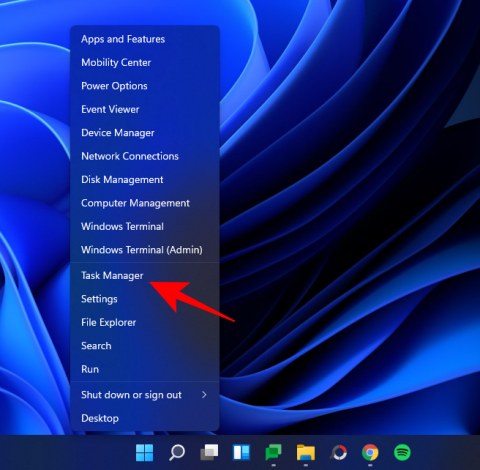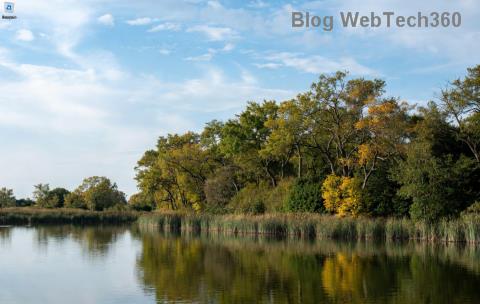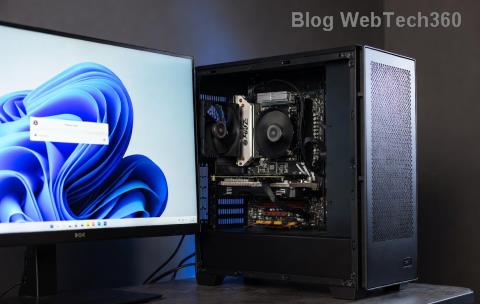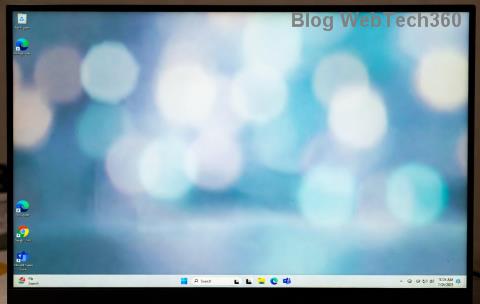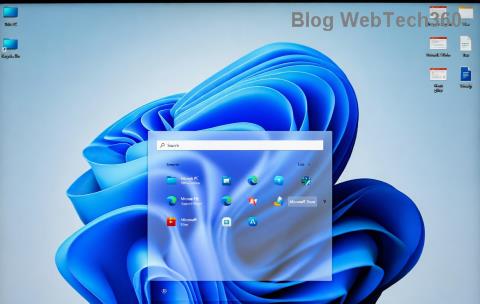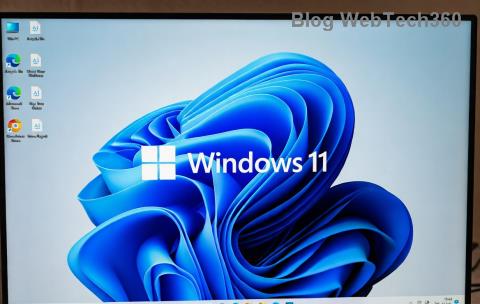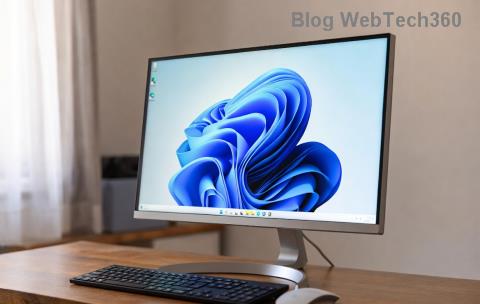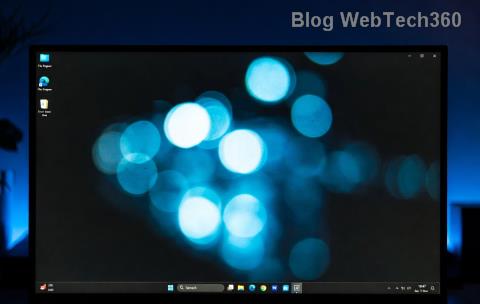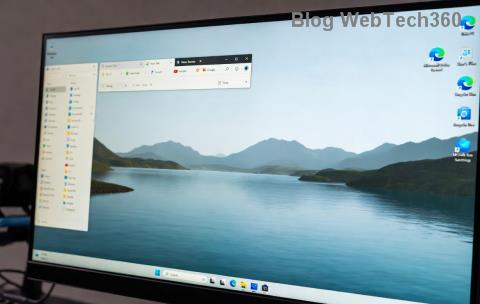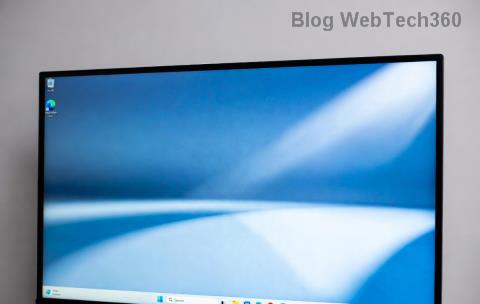
Windows Explorer je pristupnik grafičkog korisničkog sučelja (GUI) s kojim se krećemo po operacijskom sustavu Windows. To je korisnička ljuska koja omogućuje istraživanje radne površine, upravitelja datotekama, izbornika Start i programske trake te niza drugih stvari povezanih s njim. U određenim situacijama možda ćete ga morati ponovno pokrenuti, na primjer kada jedan ili više njegovih elemenata počnu kvariti ili ako se zaslon zamrzne.
Uz Windows 11, Microsoft je uvelike podupro Windows Explorer i 'centralizirao' cijelo iskustvo. Ali načini za ponovno pokretanje su i dalje isti. Ovdje ćemo pogledati kako ponovno pokrenuti Windows Explorer i što se događa kada to učinite.
Sadržaj
Što se događa kada ponovno pokrenete Windows Explorer (i kada biste to trebali učiniti)?
Ponovno pokretanje Windows Explorera isto je kao ponovno pokretanje bilo koje druge aplikacije – isključuje korisničku ljusku i ponovno je pokreće. To znači da će se svi procesi koji ovise o njemu, kao što su radna površina, programska traka, izbornik Start i File Explorer, ponovno učitati, popravljajući tako sve male probleme do kojih je moglo doći. Ako se vaš sustav zamrzava ili kasni, ponovno pokretanje Windows Explorera često je dovoljno za rješavanje problema.
Dobro je znati kako to učiniti jer je to jedan od najbržih načina popravljanja problema s radnom površinom ili nereagirajuće programske trake. Windows Explorer se također mora ponovno pokrenuti svaki put kada unesete promjene u registar HKEY_CURRENT_USER, što je još jedan razlog da znate kako to učiniti.
Također možete jednostavno prekinuti Windows Explorer bez ponovnog pokretanja. Ako to učinite, ostat će vam prazna radna površina bez programske trake ili izbornika Start. Istraživač datoteka također neće biti dostupan. Ali ponovno ga pokrenuti je teško.
Povezano: Kako resetirati Windows 11
Ponovno pokrenite File Explorer u sustavu Windows 11
Ovdje su svi načini na koje možete ponovno pokrenuti Windows Explorer u sustavu Windows 11. Imajte na umu da iako su vizualne reference prikazane u ovom vodiču za Windows 11, ove metode rade i za Windows 10.
Metoda #01: Korištenje upravitelja zadataka
Prvo otvorite Upravitelj zadatakaCtrl + Shift + Esc istovremenim pritiskom . Alternativno, možete jednostavno desnom tipkom miša kliknuti izbornik Start i odabrati Upravitelj zadataka .
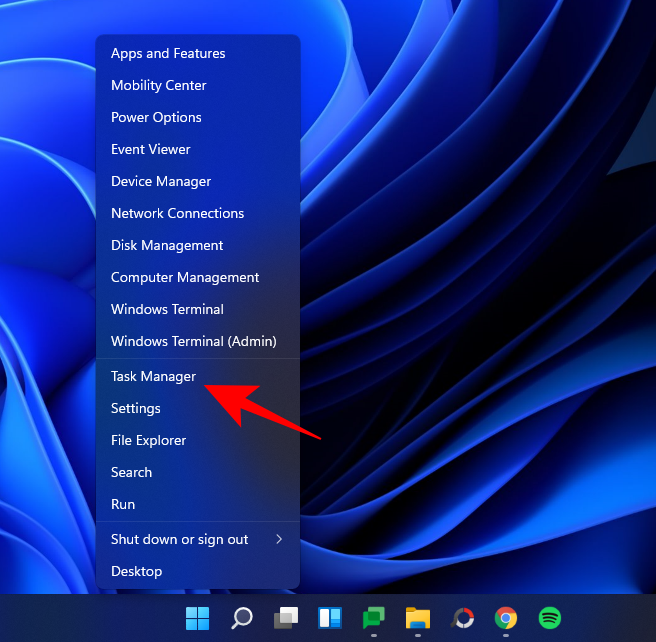
Kliknite na Više pojedinosti ako se Task Manager otvori u minijaturnom obliku.
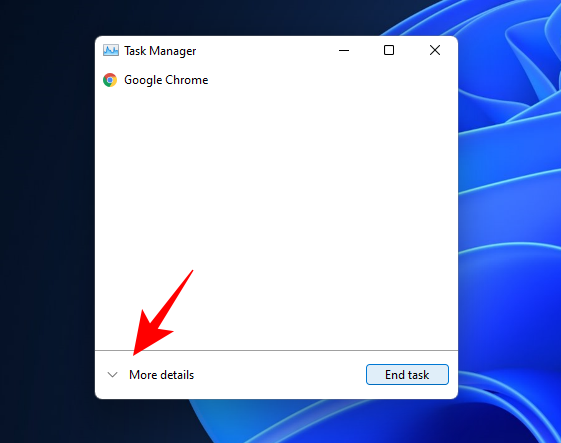
Pomičite se kroz Procese i pronađite Windows Explorer. Odaberite ga i zatim kliknite na Restart u donjem desnom kutu.
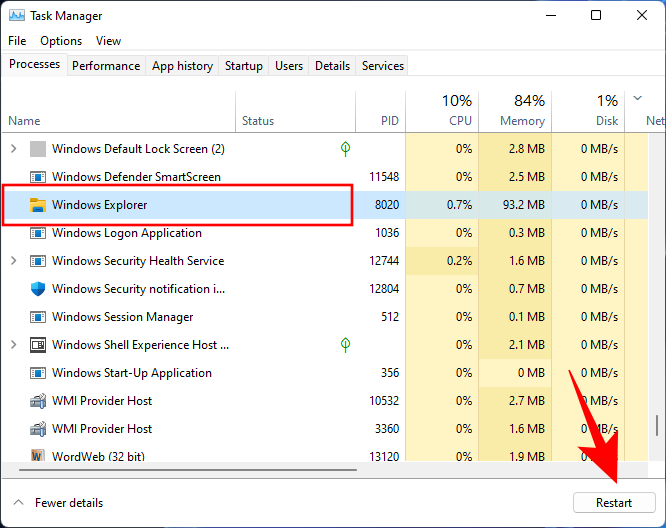
Vizualni elementi na vašem zaslonu će na trenutak nestati, a zatim se vratiti. To znači da je Windows Explorer uspješno zatvoren i ponovno pokrenut.
Povezano: Kako deinstalirati ažuriranja na Windows 11
Metoda #02: Korištenje naredbenog retka/Windows Terminal/PowerShell
Drugi način za ponovno pokretanje Windows Explorera je putem Windows terminala kao što je Command Prompt ili PowerShell. U našem primjeru idemo s prvim, ali naredbe su iste za obje.
Pritisnite Start, upišite cmd (ili powershell), a zatim kliknite Pokreni kao administrator .
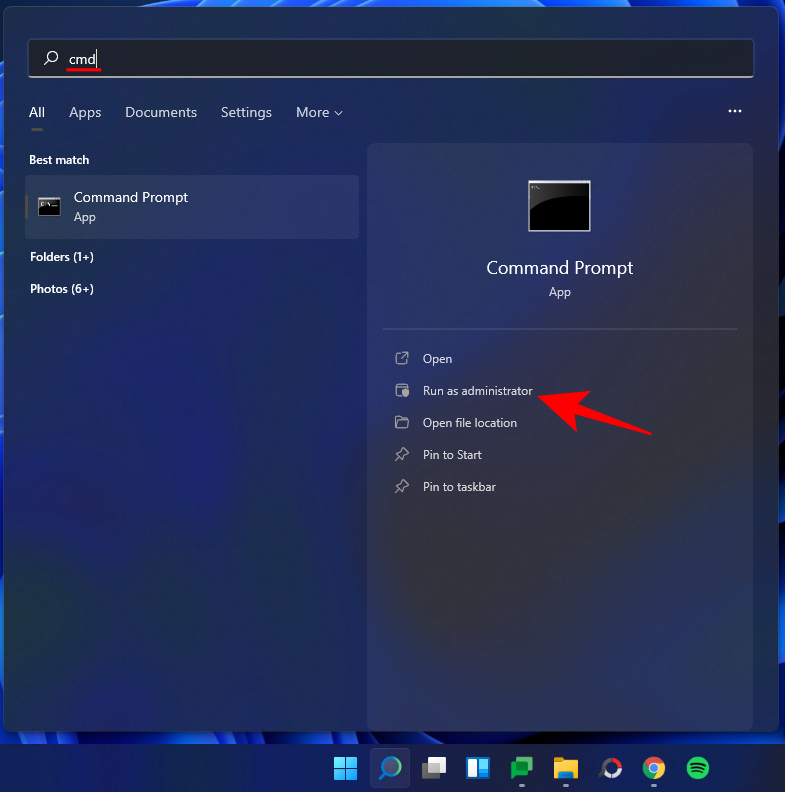
Sada upišite sljedeću naredbu:
taskkill /f /im explorer.exe

Zatim pritisnite Enter. Čim to učinite, vidjet ćete da radna površina postaje crna, a izbornik Start i programska traka nestaju. To znači da ste uspješno zatvorili Windows Explorer. Da biste ga ponovno pokrenuli, upišite sljedeću naredbu:
start explorer.exe

Zatim pritisnite Enter. Vizualni elementi će se brzo vratiti.
Metoda #03: Korištenje skupne skripte
Također možete stvoriti skupnu skriptu za ponovno pokretanje Windows Explorera tako da sljedeći put kada to trebate učiniti, trebate samo dvaput kliknuti na nju. Evo kako:
Desnom tipkom miša kliknite radnu površinu i odaberite Novo > Tekstualni dokument .
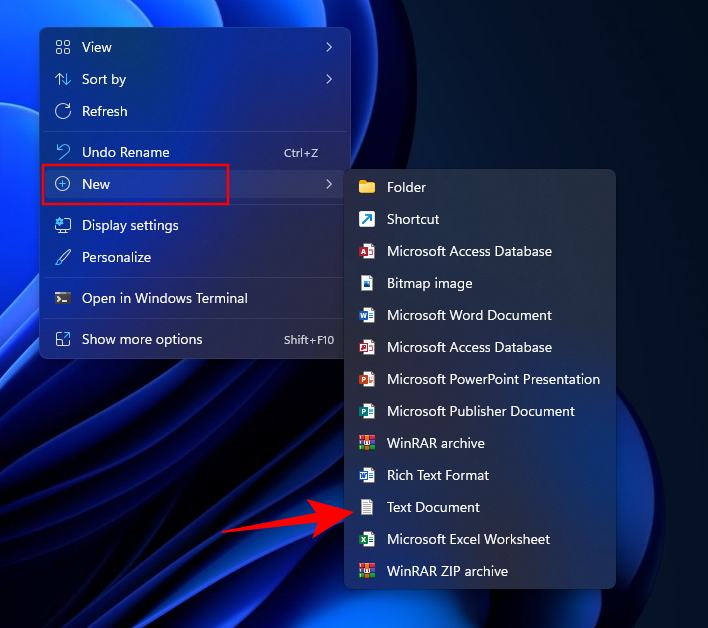
Otvorite ovu datoteku Notepad-a, a zatim upišite sljedeće:
@echo off
taskkill /f /im explorer.exe
start explorer.exe
Alternativno, možete kopirati gore navedeno i zalijepiti ga u tekstualni dokument.
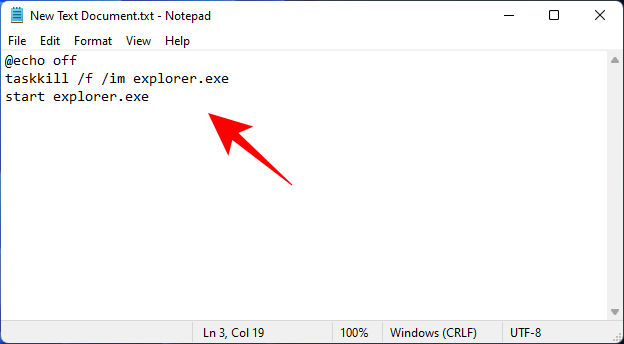
Zatim kliknite na Datoteka .
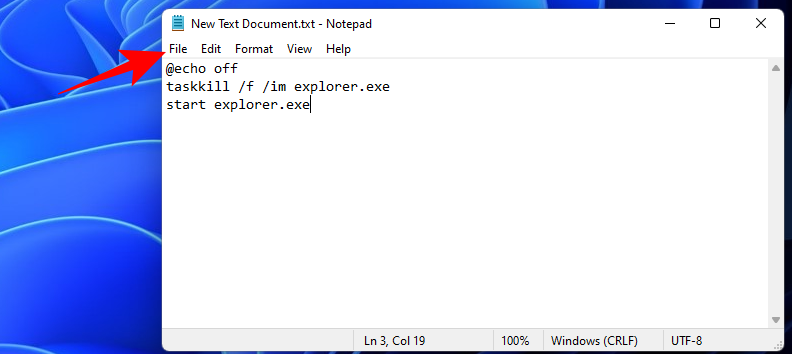
Odaberite Spremi kao .
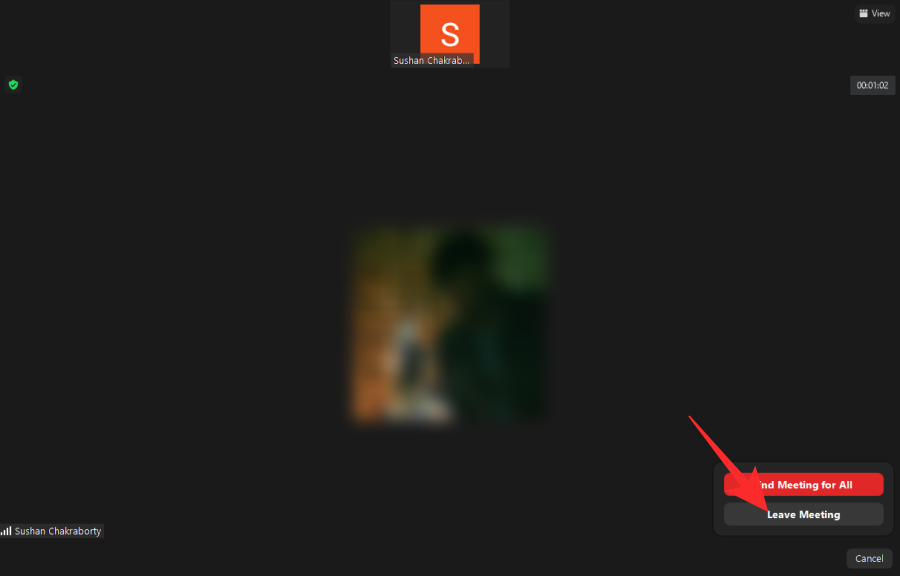
Dajte ovoj datoteci ime i spremite njezine ekstenzije kao .bat . Zatim kliknite na padajući izbornik pored Save as type .
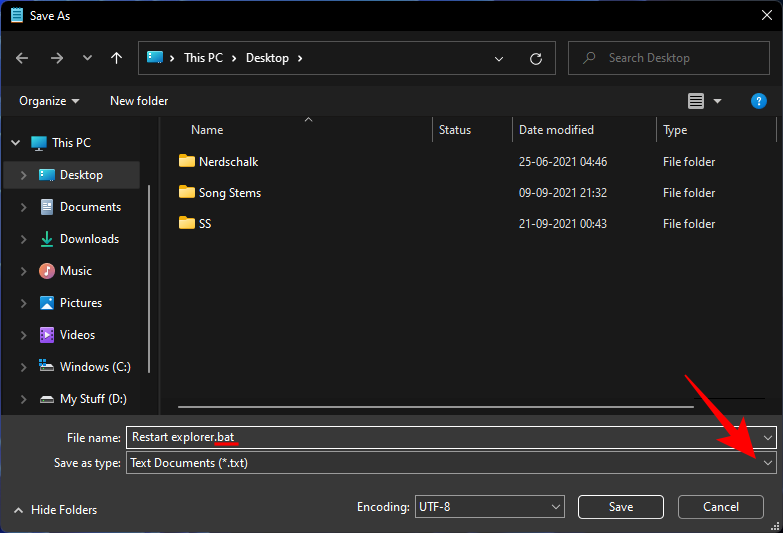
Odaberite Sve datoteke .
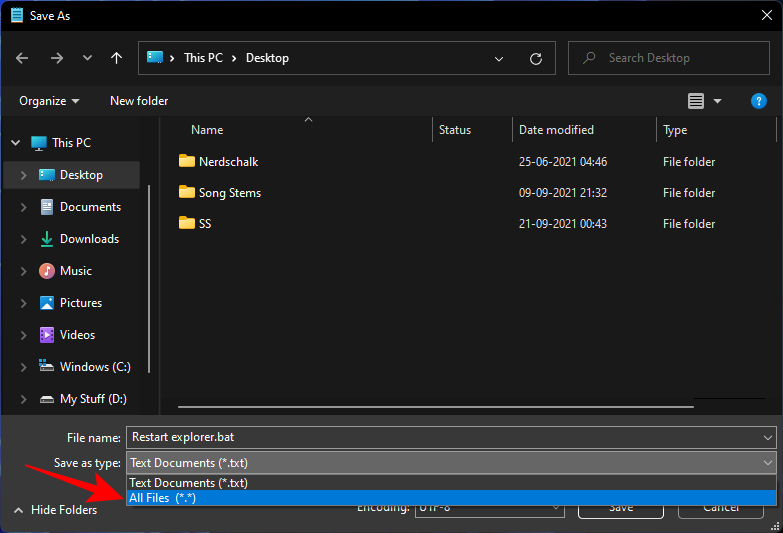
Zatim kliknite Spremi .
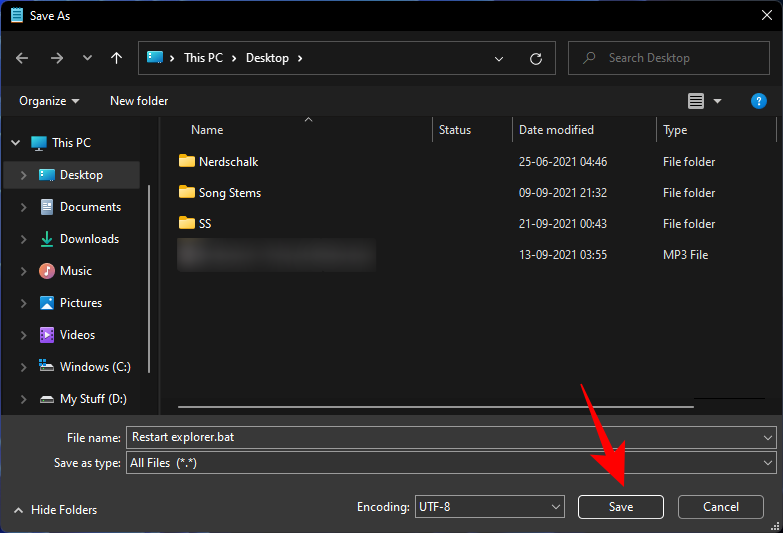
Vaša batch datoteka za ponovno pokretanje Windows Explorera sada je stvorena na radnoj površini. Kad god trebate ponovno pokrenuti Windows Explorer, jednostavno dvaput kliknite na ovu .bat datoteku.
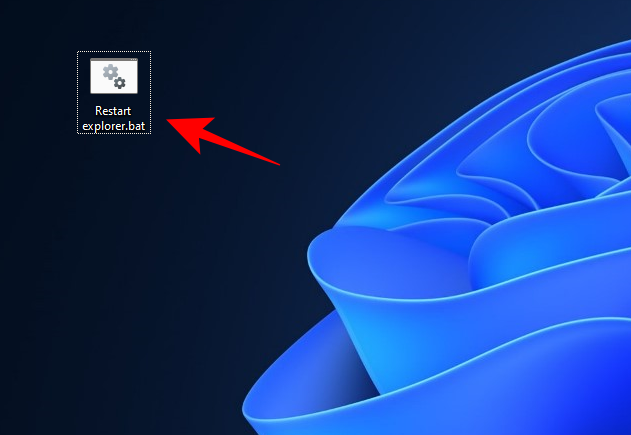
Ako vam se gore spomenute metode čine previše razrađenim, možete dodati opciju za ponovno pokretanje Windows Explorera u kontekstni izbornik radi lakšeg pristupa. Međutim, da biste to učinili, morat ćete stvoriti datoteku registra specifičnu za zadatak. Evo kako to učiniti:
Otvorite tekstualni dokument (datoteku Notepad) kao što je prikazano prije. Zatim upišite sljedeće:
Windows Registry Editor Version 5.00
[HKEY_CLASSES_ROOT\DesktopBackground\Shell\Restart Explorer]
"icon"="explorer.exe"
"Position"="Bottom"
"SubCommands"=""
[HKEY_CLASSES_ROOT\DesktopBackground\Shell\Restart Explorer\shell\01menu]
"MUIVerb"="Restart Explorer Now"
[HKEY_CLASSES_ROOT\DesktopBackground\Shell\Restart Explorer\shell\01menu\command]
@=hex(2):63,00,6d,00,64,00,2e,00,65,00,78,00,65,00,20,00,2f,00,63,00,20,00,74,\
00,61,00,73,00,6b,00,6b,00,69,00,6c,00,6c,00,20,00,2f,00,66,00,20,00,2f,00,\
69,00,6d,00,20,00,65,00,78,00,70,00,6c,00,6f,00,72,00,65,00,72,00,2e,00,65,\
00,78,00,65,00,20,00,20,00,26,00,20,00,73,00,74,00,61,00,72,00,74,00,20,00,\
65,00,78,00,70,00,6c,00,6f,00,72,00,65,00,72,00,2e,00,65,00,78,00,65,00,00,\
00
[HKEY_CLASSES_ROOT\DesktopBackground\Shell\Restart Explorer\shell\02menu]
"MUIVerb"="Restart Explorer with Pause"
"CommandFlags"=dword:00000020
[HKEY_CLASSES_ROOT\DesktopBackground\Shell\Restart Explorer\shell\02menu\command]
@=hex(2):63,00,6d,00,64,00,2e,00,65,00,78,00,65,00,20,00,2f,00,63,00,20,00,40,\
00,65,00,63,00,68,00,6f,00,20,00,6f,00,66,00,66,00,20,00,26,00,20,00,65,00,\
63,00,68,00,6f,00,2e,00,20,00,26,00,20,00,65,00,63,00,68,00,6f,00,20,00,53,\
00,74,00,6f,00,70,00,70,00,69,00,6e,00,67,00,20,00,65,00,78,00,70,00,6c,00,\
6f,00,72,00,65,00,72,00,2e,00,65,00,78,00,65,00,20,00,70,00,72,00,6f,00,63,\
00,65,00,73,00,73,00,20,00,2e,00,20,00,2e,00,20,00,2e,00,20,00,26,00,20,00,\
65,00,63,00,68,00,6f,00,2e,00,20,00,26,00,20,00,74,00,61,00,73,00,6b,00,6b,\
00,69,00,6c,00,6c,00,20,00,2f,00,66,00,20,00,2f,00,69,00,6d,00,20,00,65,00,\
78,00,70,00,6c,00,6f,00,72,00,65,00,72,00,2e,00,65,00,78,00,65,00,20,00,26,\
00,20,00,65,00,63,00,68,00,6f,00,2e,00,20,00,26,00,20,00,65,00,63,00,68,00,\
6f,00,2e,00,20,00,26,00,20,00,65,00,63,00,68,00,6f,00,20,00,57,00,61,00,69,\
00,74,00,69,00,6e,00,67,00,20,00,74,00,6f,00,20,00,73,00,74,00,61,00,72,00,\
74,00,20,00,65,00,78,00,70,00,6c,00,6f,00,72,00,65,00,72,00,2e,00,65,00,78,\
00,65,00,20,00,70,00,72,00,6f,00,63,00,65,00,73,00,73,00,20,00,77,00,68,00,\
65,00,6e,00,20,00,79,00,6f,00,75,00,20,00,61,00,72,00,65,00,20,00,72,00,65,\
00,61,00,64,00,79,00,20,00,2e,00,20,00,2e,00,20,00,2e,00,20,00,26,00,20,00,\
70,00,61,00,75,00,73,00,65,00,20,00,26,00,26,00,20,00,73,00,74,00,61,00,72,\
00,74,00,20,00,65,00,78,00,70,00,6c,00,6f,00,72,00,65,00,72,00,2e,00,65,00,\
78,00,65,00,20,00,26,00,26,00,20,00,65,00,78,00,69,00,74,00,00,00
Da biste pojednostavili postupak, jednostavno kopirajte gore navedeno i zalijepite ga u datoteku bilježnice.
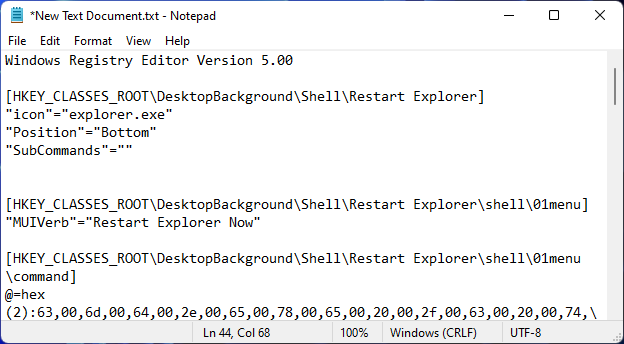
Zatim kliknite na Datoteka .
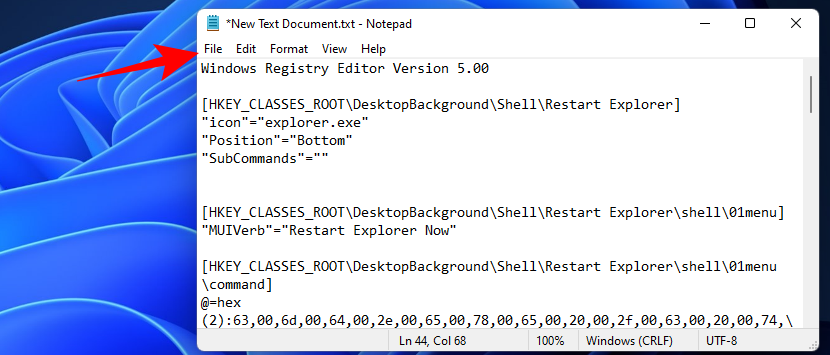
Odaberite Spremi kao .
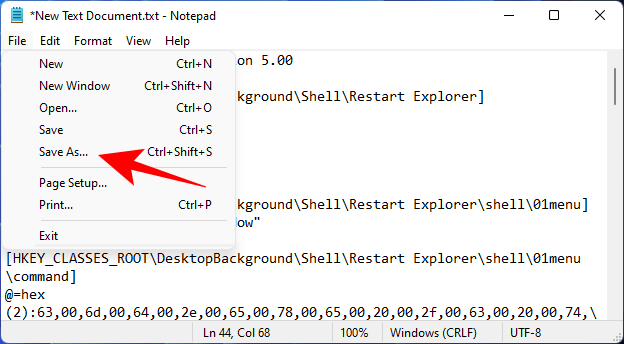
Datoteci dajte naziv i završite je s .reg . Zatim kliknite na padajući izbornik pored Save as type .
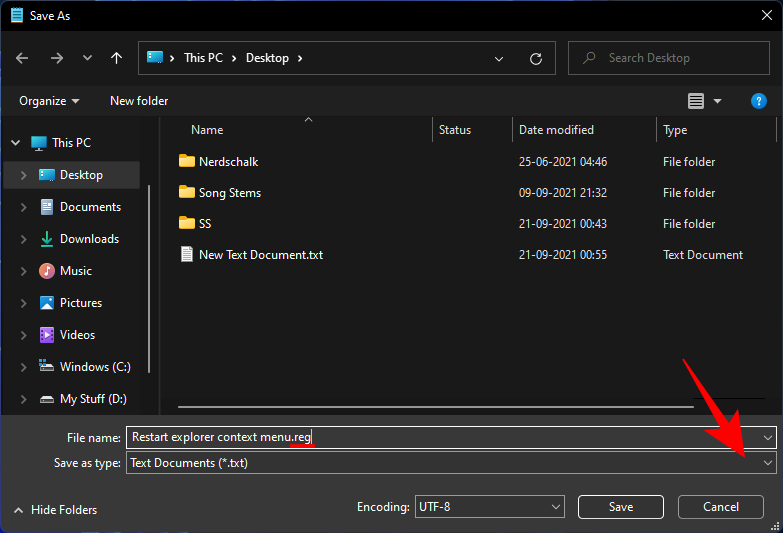
Odaberite Sve datoteke .
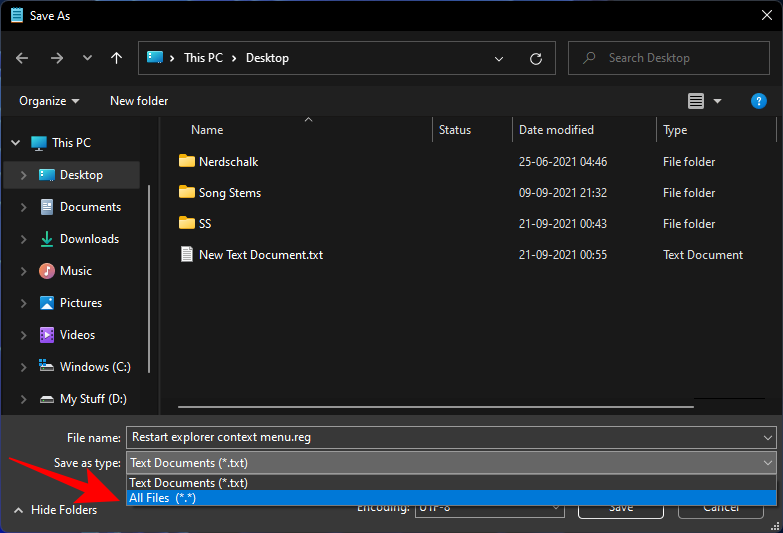
Kliknite na Spremi .
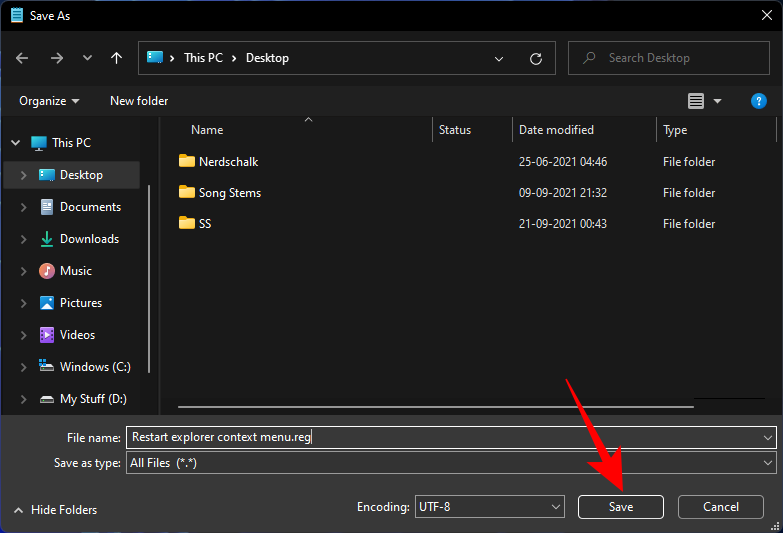
Sada dvaput kliknite ovu novostvorenu datoteku registra.
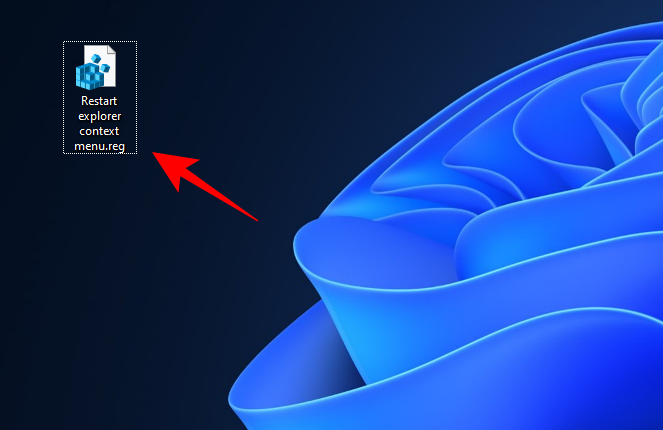
When prompted, click Yes.
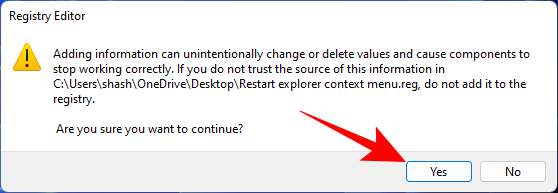
You will now get a confirmation message that the keys and values in this file are successfully added to the registry. Click OK.
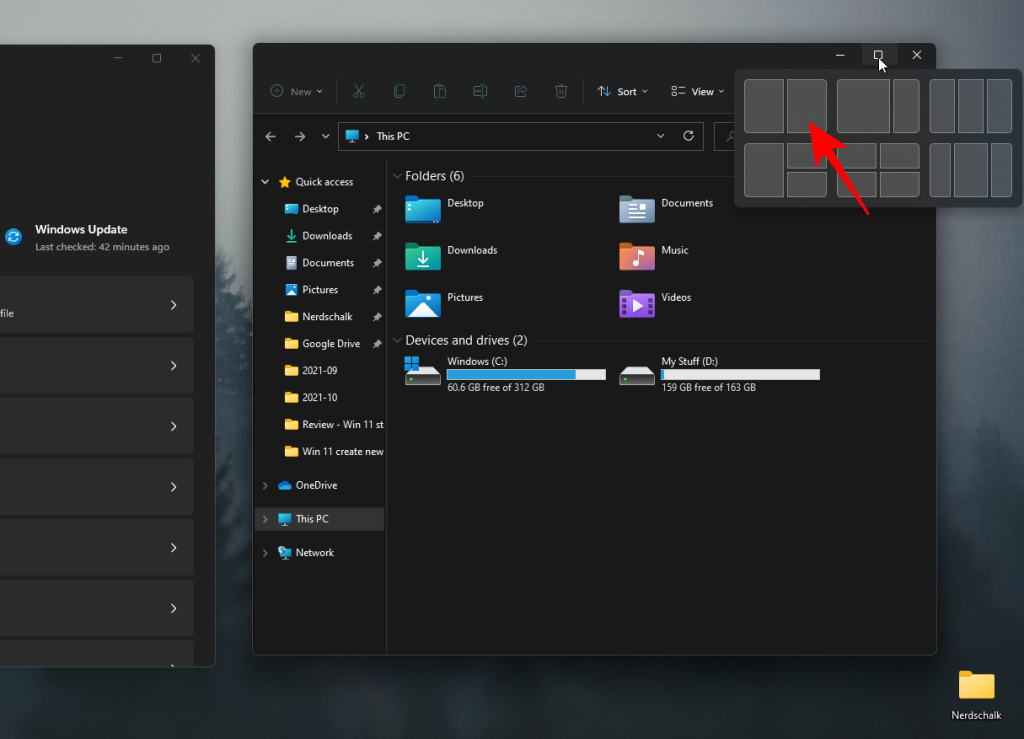
To see the new context menu option to Restart Windows Explorer, right-click on the desktop and select Show more options.
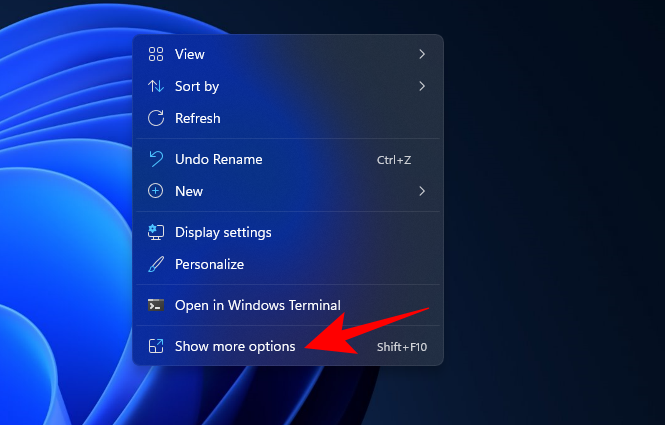
The option to Restart Explorer will be at the bottom. Hover over it to get the options to Restart Explorer Now or Restart Explorer with Pause.
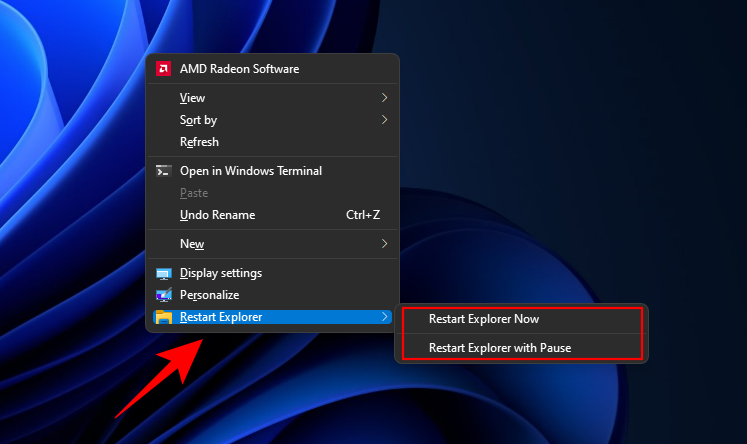
If you’d like to remove this option, create a notepad file and paste the content mentioned below in it.
Windows Registry Editor Version 5.00
[-HKEY_CLASSES_ROOT\DesktopBackground\Shell\Restart Explorer]

Then click on File > Save as.
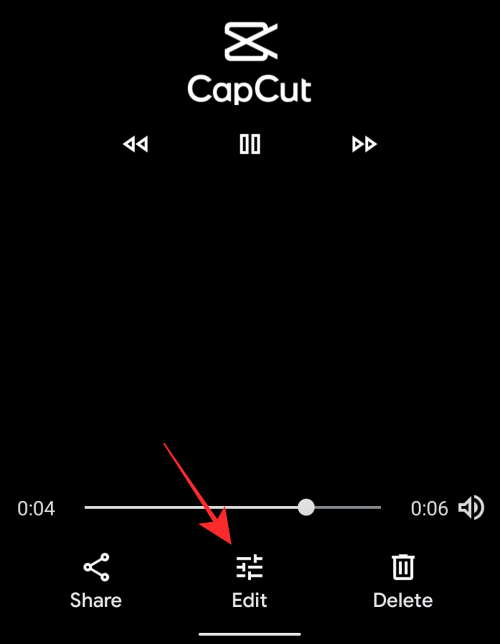
Save the file as a .reg file as we did before and save file type as ‘All files’. Then click Save.
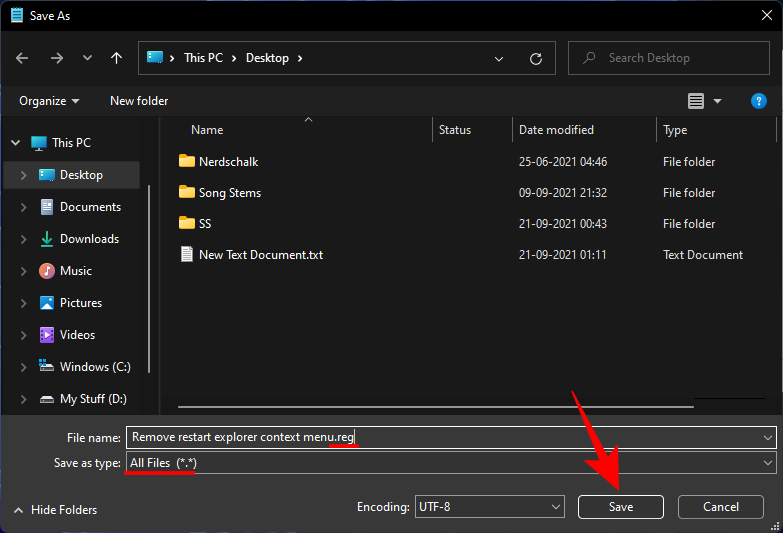
Then double-click this newly created registry file.
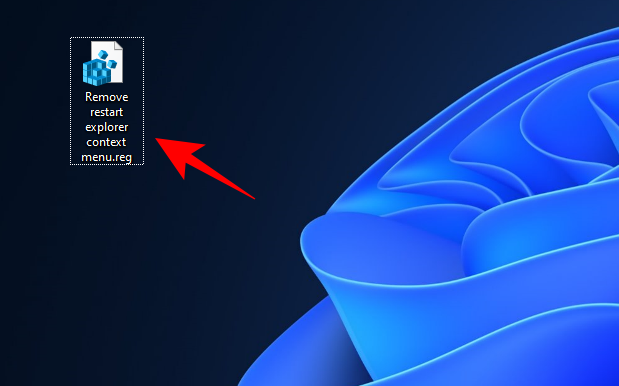
When prompted, click Yes, then click OK.

The option to restart Explorer from the Context Menu will no longer be available.
Fix: Windows Explorer has stopped working
The number one fix to Windows Explorer problems is to restart Windows Explorer using any of the methods mentioned above. This gives all the visual elements of the user shell a soft reboot, allowing them to load the data again and fix any issues that they might be having.
But there are a few other potential fixes that you may want to check out as well. Here they are:
Run SFC scan
Windows Explorer may be encountering issues due to corrupt system files. Here’s how you can check for the same and fix it:
Press Start, type cmd, and click on Run as administrator.
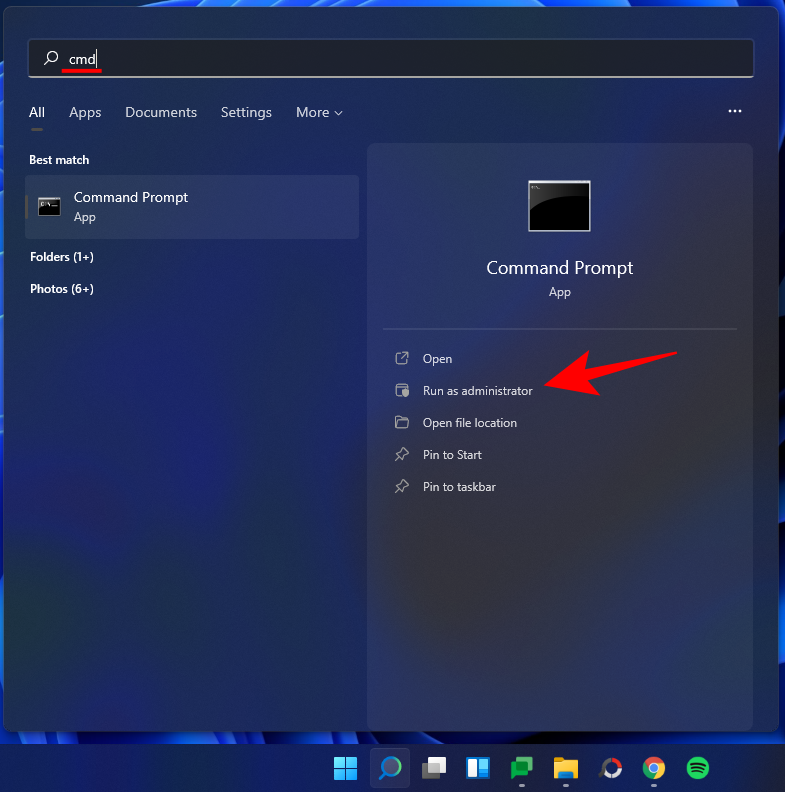
Now type the following command:
sfc /scannow

Then press Enter. This will start the System File Checker scan. You may have to wait a while before the process is finished.
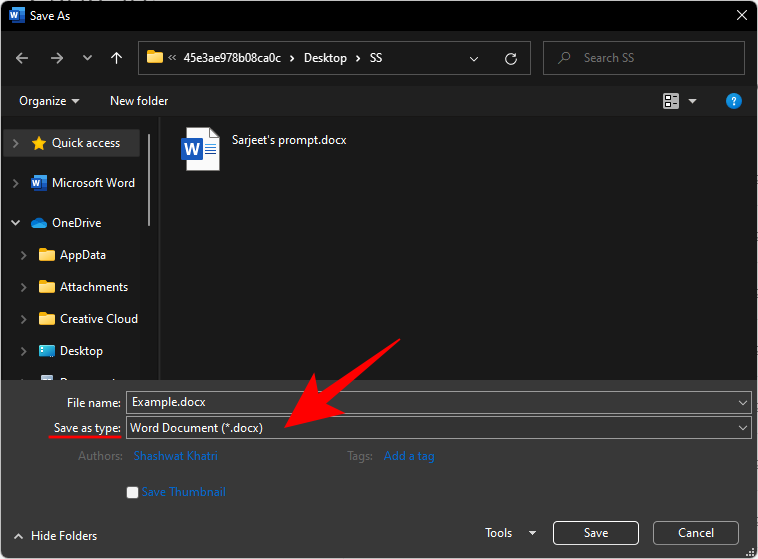
SFC Scan will find any potential problems and fix them for you.
Reboot in Safe Mode to identify the problem
Sometimes, corrupt third-party applications may be the cause of the problem. But to make sure this is the case, we have to reboot the PC in Safe Mode first. Here’s how to do so:
Press Start and click on the ‘Power’ button.
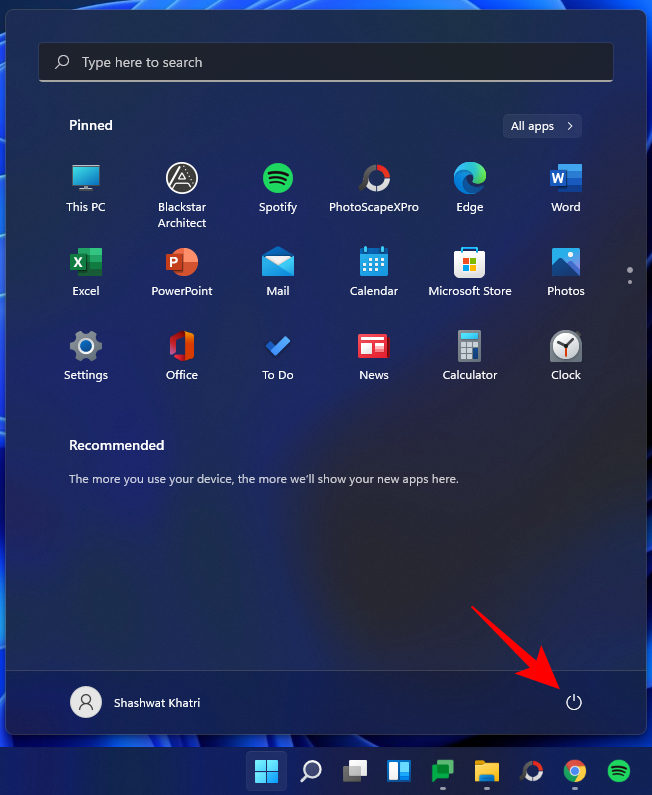
Then, while holding down the ‘Shift’ key, click on Restart.
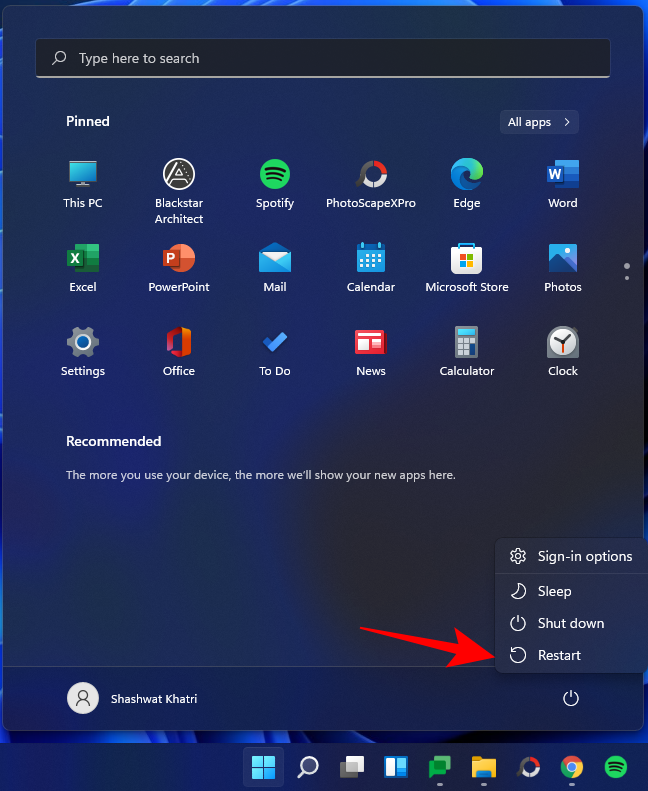
Now, while the computer is restarting, you will be taken to the Advanced Restart options. Select Troubleshoot.
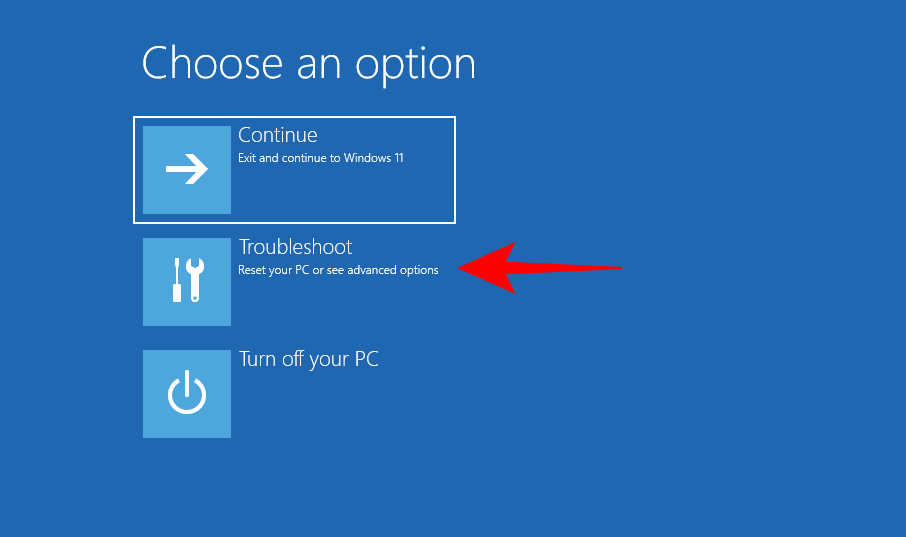
Click on Advanced options.
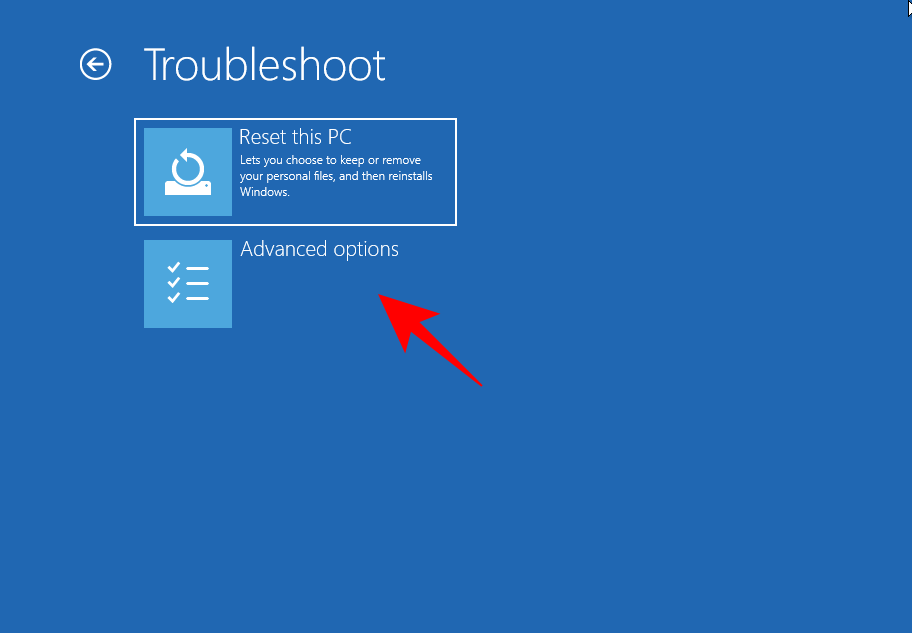
Click on Startup Settings.
Click Restart.
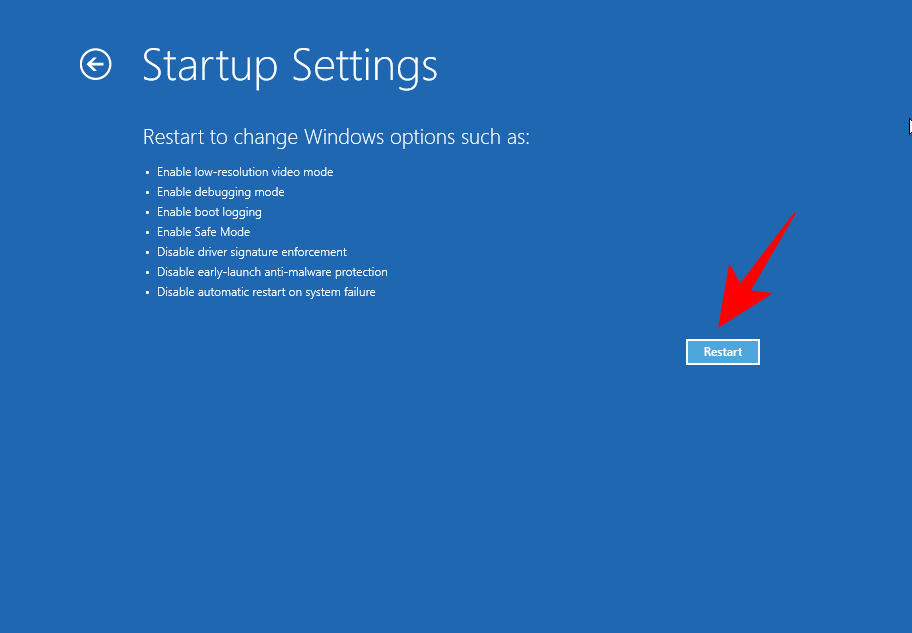
Now press the number that corresponds to Enable Safe Mode with Networking.
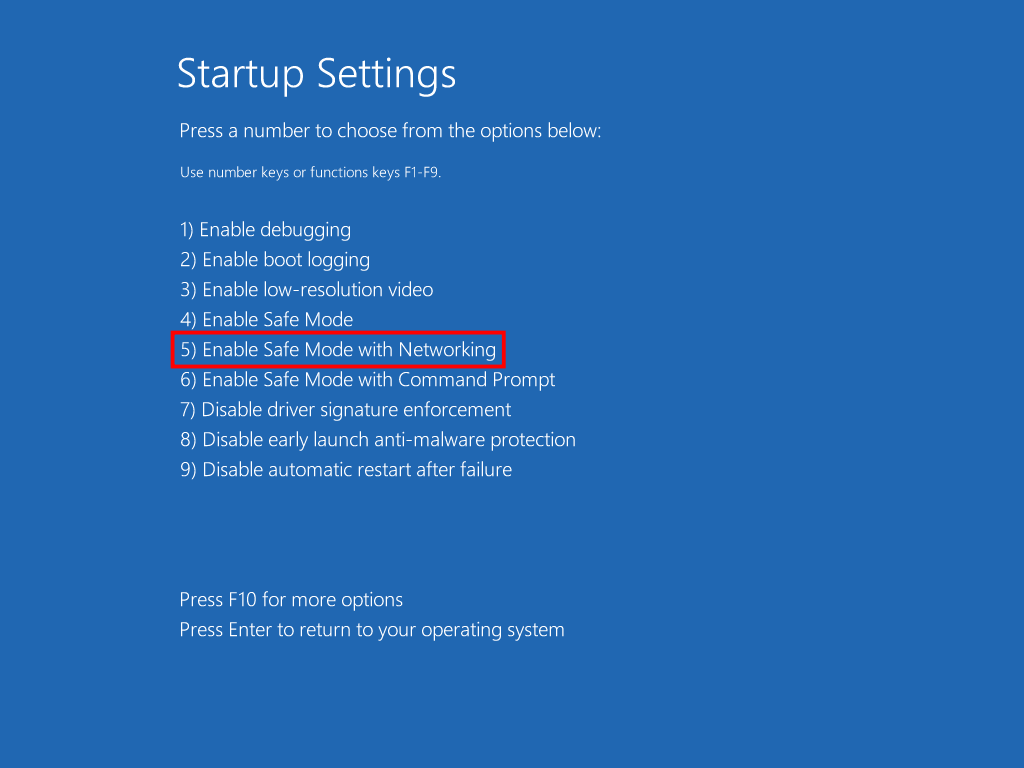
Check if the problem still persists in Safe Mode. If it does, here’s what you need to do.
Boot the computer back up normally, then press Start, type msconfig, and click on Run as administrator.
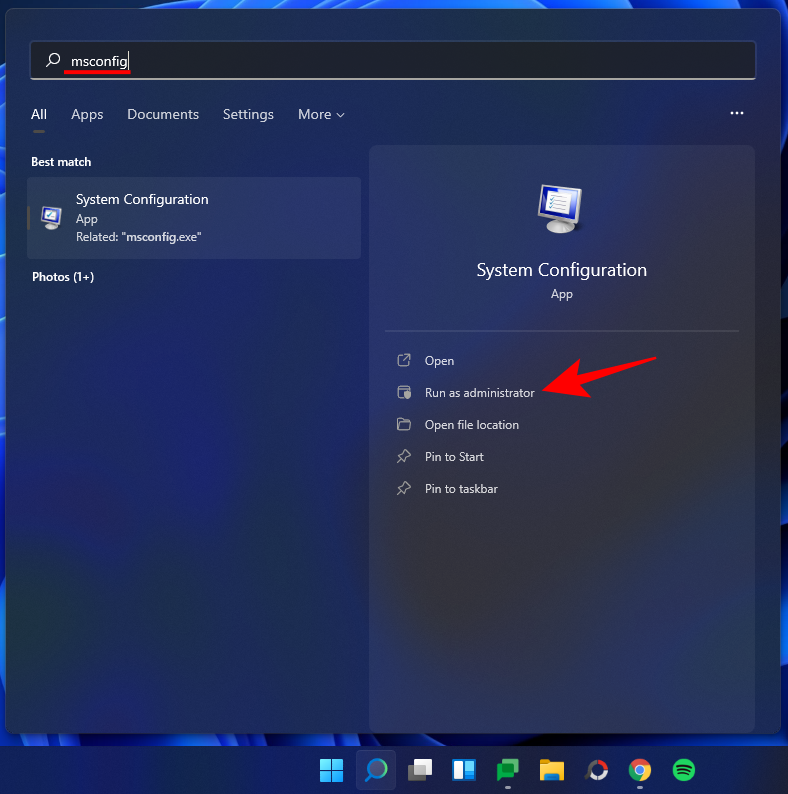
Under the ‘General’ tab, make sure to select Selective startup, but uncheck Load startup items.
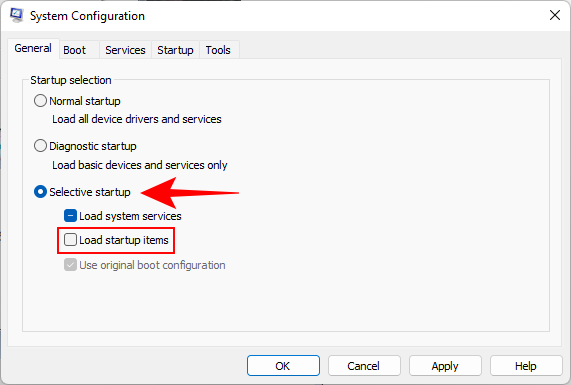
Then switch over to the ‘Services’ tab.
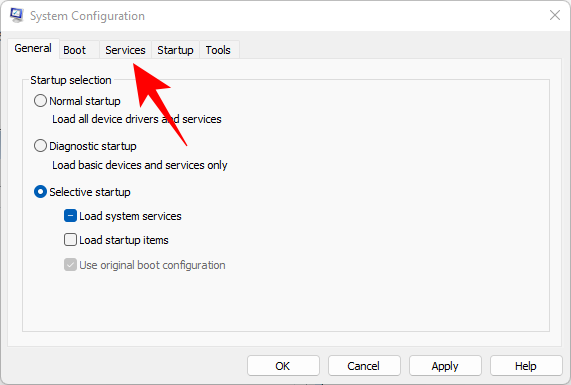
Here, click on Hide all Microsoft services at the bottom to select it. Then click Disable all.
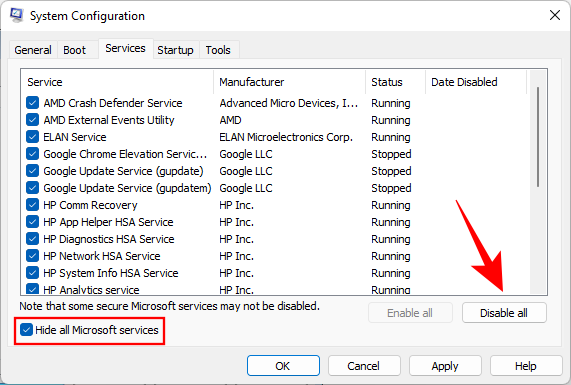
Click OK.
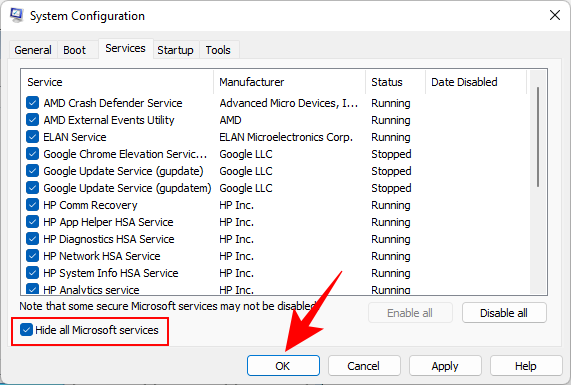
Restart your PC normally. If Windows Explorer is working fine, then the issue was caused most likely by a third-party app. You may need to hunt down exactly which program was interfering with the proper functioning of Windows Explorer.
We recommend uninstalling any recent apps that you may have installed around the time when this problem started to appear.
Scan for viruses
You should definitely run a full virus scan with your anti-virus program to find any viruses or malware lurking in your computer. Viruses come in various kinds and have the capacity to wreak havoc on your system, and a non-functioning Windows Explorer is one of the major symptoms.
Frequently Asked Questions (FAQs)
Windows Explorer is tied to a variety of visual elements that we as users interact with on a daily basis. It is only natural then to have questions about its functioning and what all you can do after you end or restart it. Here we answer a few commonly asked queries so you have all the information you need to make adjustments to Windows Explorer.
Is it safe to end Windows Explorer?
Yes, it is safe to end Windows Explorer. Doing so won’t lead to any problems. In fact, it may possibly fix the problems its elements may be experiencing. However, if you only end Windows Explorer without starting it up back again, you won’t have access to those very elements that have made Windows 11 stand out from its predecessors.
How often should I restart Windows Explorer?
Under normal circumstances, you won’t need to restart Windows Explorer at all. One of the main reasons why people restart Windows Explorer is when they’ve made changes to the registry the HKEY_CURRENT_USER registry key and need to see the changes implemented.
Other than that, Windows Explorer will require a soft reboot if one or more of its elements begin to malfunction. But if you’re constantly having to restart Windows Explorer, the problem may be found elsewhere. Refer to our fixes above to sort this issue.
Why does Windows Explorer keep crashing?
There are a few reasons why Windows Explorer may not be working as usual. But viruses within third-party applications downloaded from unknown or untrustworthy sources is one of the common cause for this. Windows Update too can introduce Explorer bugs with recent updates, especially if you’re on the Dev channel, although it’s not often the case.
Is any data lost when restarting Windows Explorer?
No, your data is not lost when you restart Windows Explorer. All your files and applications will return to the state in which they were when you restarted Windows Explorer. The only elements that are impacted are the UI elements that are dependent on Windows Explorer, such as the desktop, the Start Menu, File Explorer, and the taskbar.
Do copy paste keep working or get stopped?
Yes, the copy-paste function still keeps working when you end or restart Windows Explorer.
Can you reopen the same windows again after restarting Windows Explorer?
Yes, you can open the same windows again after restarting Windows Explorer. However, if you were using File Explorer to navigate through your drives and folders, you will have to open it up from the beginning and get to the folders you were accessing when you restarted Windows Explorer.
So these were the ways that you can restart Windows Explorer and when you should be doing so. We hope you now have a better understanding of the processes of Windows Explorer and the ways to manage them.
RELATED

